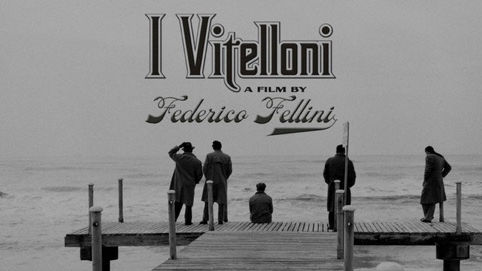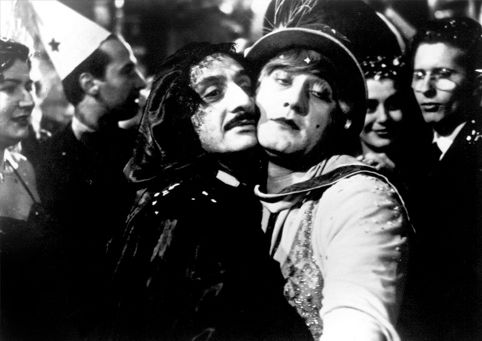Three reasons why you should watch Fellini’s classic comedy ‘I Vitelloni’ (1953):
- Oltremànica

- Jan 30, 2020
- 4 min read
Now that it’s Fellini season at the British Film Institute you have no excuses to miss some of the most iconic Italian films of all time. The BFI has made available on their streaming service masterpieces like ‘La dolce vita’, ‘8 ½’ and ‘I Vitelloni’, all for a ridiculous £5 monthly subscription – and it comes with a 14 days free trial! As I said, no excuses.

If you ever wondered what Trainspotting would be like if it was made in 1950’s Italy, ‘I Vitelloni’ is the closest answer you can get.
‘I Vitelloni’ is often referred to as the hidden gem of Fellini’s filmography. Coming out in 1953, the film is Fellini’s second work, featuring Italian iconic actor Alberto Sordi and the photography of Otello Martelli – also behind the camera for ‘Nights of Cabiria’ and ‘La Dolce Vita’ – . Representative of an early Fellini, still closer to Italian neo-realism – e.g. ‘Rome, Open City’, ‘Bicycle Thieves’ –, the film tells the story of five young men lazily wasting their lives in a coastal town in Romagna, central Italy. The word ‘Vitelloni’ (literally meaning bullocks), if used on a person, suggests that he is somewhat naïve and lazy, a good for nothing. Covering roughly a year of their lives, the focus revolves mainly around the romantic adventures of Fausto, the playboy of the group.

Here are the three reasons why you should watch ‘I Vitelloni’:
It is still funny, 67 years later: Right, I am not gonna lie: speaking Italian might make a tiny difference here. Or at least I thought so. I was lucky enough to watch it on the big screen and I can assure you that the Brits seemed to be having as much of a good time as the Italians. Out of the 5 men all but one, the melancholic Moraldo, work so well as comical characters. What makes it so funny also for non-Italians is perhaps the physicality of much of the Vitelloni comedy, the reliance on gestures, facial expressions and sometimes on a quite over the top acting. But do not worry, the performances and the situations they are placed in are never too silly and have ‘seasoned’ quite well. However, the main reason why the ‘Vitelloni’ is still so successful at making you laugh is because it knows damn well how and when to be serious, which takes me to the second reason of the list.
Fellini’s ability to switch between comedy and drama: The film is littered, and I mean littered, with comical scenes that turn dramatic, or vice-versa. My personal favourite is the scene of the carnival: what starts off as a very extravagant and light-hearted sequence ends up with an almost existential monologue by a hopelessly drunk Alberto, Sordi’s character. Most funny moments hide an unpredicted melancholia, and this has largely to do with our five protagonists. The young men live their lives by the day and without worries, but ultimately they can afford this lifestyle only thanks to their middle-class families. None of them has plans for the future, and in fact they seem to live as if future doesn’t exist. Leopoldo is the only one who seems to have ambitions: he wants to become a playwright, and he has his big chance when a famous actor from Rome comes to the town. The scene that follows is almost a comical archetype, with the young wannabe-artist tormenting his idol with his ideas and dreams. The comedy is there, and so is a subtle bitterness, but drama floods into the picture once the famous actor reveals his true intentions and tries to lure Leopoldo into having sex with him. In several occasions the protagonists are confronted by realistic responsibilities, and when that happens all their weakness are suddenly revealed. Fellini briefly shows us what deeper anxieties are hidden behind the Vitelloni’s nihilism, and what the consequences of that lifestyle can be. Our five protagonists are comedic heroes, but real-life losers.
Masculinity in the ‘Vitelloni’: The way Fausto flirts with women is by far the most controversial aspect of the whole film, if one judges it by modern standards. His attempts to get with two women he likes end up in both cases to him forcefully kissing said ladies. During both scenes the audience laughed, but you could hear it just got a little bit more awkward. Fausto was undoubtedly intended to be a divisive character, a shrewd and selfish Casanova, but one definitely gets the idea that what at the time was perceived as at best a bit exaggerated is by now seen as basically sexual harassment. Making the situation worse there is the fact that Sandra, Fausto’s wife, is a very weak character, always played around by her husband because of her ingenuity. In the light of movements like ‘Me Too’ and the whole attention it gathered on the issue of sexual harassment it can be useful to remind ourselves what used to be considered acceptable between men and women. And Italy is especially a country that needs to be reminded of this, given the recent controversy around the misogynistic words of big Italian TV personality Amadeus. However, the ‘Vitelloni’ also makes fun of some masculine tropes. These men all still live with their parents and their ridiculous childishness is often portrayed as an embarrassing weakness. Here Alberto’s comical attachment to his mother is again a very good intersection between comedy and tragedy. There are also a couple of instances where the situations between Fausto, Moraldo and Alberto can hint at some possible homoeroticism, and the ‘Vitelloni’ certainly comes out as a comedy also about some masculine stereotype.
Giorgio Lattanzi





Comments